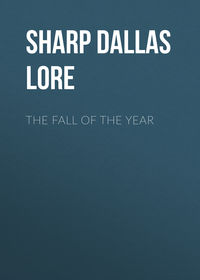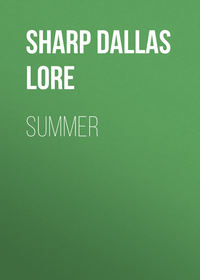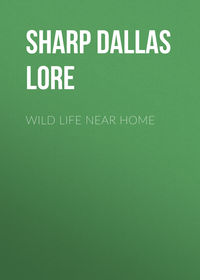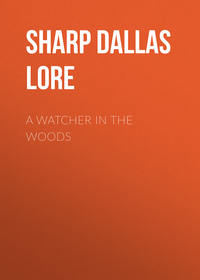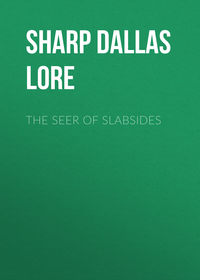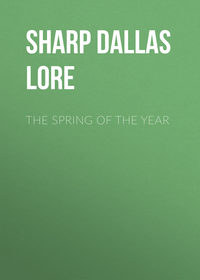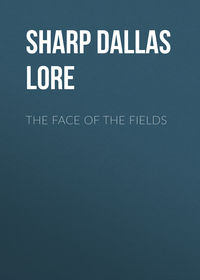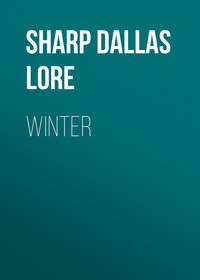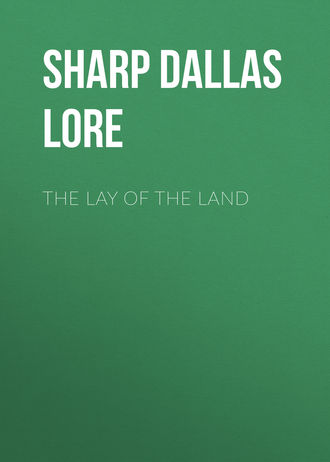 полная версия
полная версияThe Lay of the Land
High and alone in a bare persimmon tree for one’s dinner hardly sounds like a merry Christmas. But I was not alone. I had noted the fresh tracks beneath the tree before I climbed up, and now I saw that the snow had been partly brushed from several of the large limbs as the ’possum had moved about in the tree for his Christmas dinner. We were guests at the same festive board, and both of us at Nature’s invitation. It mattered not that the ’possum had eaten and gone this hour or more. Such is good form in the woods. He was expecting me, so he came early, out of modesty, and, that I too might be entirely at my ease, he departed early, leaving his greetings for me in the snow.
Thus I was not alone; here was good company and plenty of it. I never lack a companion in the woods when I can pick up a trail. The ’possum and I ate together. And this was just the fellowship I needed, this sharing the persimmons with the ’possum. I had broken bread, not with the ’possum only, but with all the out-of-doors. I was now fit to enter the woods, for I was filled with good-will and persimmons, as full as the ’possum; and putting myself under his gentle guidance, I got down upon the ground, took up his clumsy trail, and descended toward the swamp. Such an entry is one of the particular joys of the winter. To go in with a fox, a mink, or a ’possum through the door of the woods is to find yourself at home. Any one can get inside the out-of-doors, as the grocery boy or the census man gets inside our houses. You can bolt in at any time on business. A trail, however, is Nature’s invitation. There may be other, better beaten paths for mere feet. But go softly with the ’possum, and at the threshold you are met by the spirit of the wood, you are made the guest of the open, silent, secret out-of-doors.
I went down with the ’possum. He had traveled home leisurely and without fear, as his tracks plainly showed. He was full of persimmons. A good happy world this, where such fare could be had for the picking! What need to hurry home, except one were in danger of falling asleep by the way? So I thought, too, as I followed his winding path; and if I was tracking him to his den, it was only to wake him for a moment with the compliments of the season. But it was not even a momentary disturbance; for when I finally found him in his hollow gum, he was sound asleep, and only half realized that some one was poking him gently in the ribs and wishing him a merry Christmas.
The ’possum had led me to the centre of the empty, hollow swamp, where the great-boled gums lifted their branches like a timbered, unshingled roof between me and the wide sky. Far away through the spaces of the rafters I saw a pair of wheeling buzzards, and under them, in lesser circles, a broad-winged hawk. Here, at the feet of the tall, clean trees, looking up through the leafless limbs, I had something of a measure for the flight of the birds. The majesty and the mystery of the distant buoyant wings were singularly impressive.
I have seen the turkey-buzzard sailing the skies on the bitterest winter days. To-day, however, could hardly be called winter. Indeed, nothing yet had felt the pinch of the cold. There was no hunger yet in the swamp, though this new snow had scared the raccoons out, and their half-human tracks along the margin of the swamp stream showed that, if not hungry, they at least feared that they might be.
For a coon hates snow. He will invariably sleep off the first light snowfalls, and even in the late winter he will not venture forth in fresh snow unless driven by hunger or some other dire need. Perhaps, like a cat or a hen, he dislikes the wetting of his feet. Or it may be that the soft snow makes bad hunting – for him. The truth is, I believe, that such a snow makes too good hunting for the dogs and the gunner. The new snow tells too clear a story. His home is no inaccessible den among the ledges; only a hollow in some ancient oak or tupelo. Once within, he is safe from the dogs, but the long fierce fight for life taught him generations ago that the nest-tree is a fatal trap when behind the dogs come the axe and the gun. So he has grown wary and enduring. He waits until the snow grows crusty, when without sign, and almost without scent, he can slip forth among the long shadows and prowl to the edge of dawn.
Skirting the stream out toward the higher back woods, I chanced to spy a bunch of snow in one of the great sour gums that I thought was an old nest. A second look showed me tiny green leaves, then white berries, then mistletoe.
It was not a surprise, for I had found it here before, – a long, long time before. It was back in my schoolboy days, back beyond those twenty years, that I first stood here under the mistletoe and had my first romance. There was no chandelier, no pretty girl, in that romance, – only a boy, the mistletoe, the giant trees, and the sombre silent swamp. Then there was his discovery, the thrill of deep delight, and the wonder of his knowledge of the strange unnatural plant! All plants had been plants to him until, one day, he read the life of the mistletoe. But that was English mistletoe; so the boy’s wonder world of plant life was still as far away as Mars, when, rambling alone through the swamp along the creek, he stopped under a big curious bunch of green, high up in one of the gums, and – made his first discovery.
So the boy climbed up again this Christmas Day at the peril of his precious neck, and brought down a bit of that old romance.
I followed the stream along through the swamp to the open meadows, and then on under the steep wooded hillside that ran up to the higher land of corn and melon fields. Here at the foot of the slope the winter sun lay warm, and here in the sheltered briery border I came upon the Christmas birds.
There was a great variety of them, feeding and preening and chirping in the vines. The tangle was a-twitter with their quiet, cheery talk. Such a medley of notes you could not hear at any other season outside a city bird store. How far the different species understood one another I should like to know, and whether the hum of voices meant sociability to them, as it certainly meant to me. Doubtless the first cause of their flocking here was the sheltered warmth and the great numbers of berry-laden bushes, for there was no lack either of abundance or variety on the Christmas table.
In sight from where I stood hung bunches of withering chicken or frost grapes, plump clusters of blue-black berries of the greenbrier, and limbs of the smooth winterberry bending with their flaming fruit. There were bushes of crimson ilex, too, trees of fruiting dogwood and holly, cedars in berry, dwarf sumac and seedy sedges, while patches on the wood slopes uncovered by the sun were spread with trailing partridge berry and the coral-fruited wintergreen. I had eaten part of my dinner with the ’possum; I picked a quantity of these wintergreen berries, and continued my meal with the birds. And they also had enough and to spare.
Among the birds in the tangle was a large flock of northern fox sparrows, whose vigorous and continuous scratching in the bared spots made a most lively and cheery commotion. Many of them were splashing about in tiny pools of snow-water, melted partly by the sun and partly by the warmth of their bodies as they bathed. One would hop to a softening bit of snow at the base of a tussock, keel over and begin to flop, soon sending up a shower of sparkling drops from his rather chilly tub. A winter snow-water bath seemed a necessity, a luxury indeed, for they all indulged, splashing with the same purpose and zest that they put into their scratching among the leaves.
A much bigger splashing drew me quietly through the bushes to find a marsh hawk giving himself a Christmas souse. The scratching, washing, and talking of the birds; the masses of green in the cedars, holly, and laurels; the glowing colors of the berries against the snow; the blue of the sky, and the golden warmth of the light made Christmas in the heart of the noon that the very swamp seemed to feel.
Three months later there was to be scant picking here, for this was the beginning of the severest winter I ever knew. From this very ridge, in February, I had reports of berries gone, of birds starving, of whole coveys of quail frozen dead in the snow; but neither the birds nor I dreamed to-day of any such hunger and death. A flock of robins whirled into the cedars above me; a pair of cardinals whistled back and forth; tree sparrows, juncos, nuthatches, chickadees, and cedar-birds cheeped among the trees and bushes; and from the farm lands at the top of the slope rang the calls of meadowlarks.
Halfway up the hill I stopped under a blackjack oak, where, in the thin snow, there were signs of something like a Christmas revel. The ground was sprinkled with acorn shells and trampled over with feet of several kinds and sizes, – quail, jay, and partridge feet; rabbit, squirrel, and mice feet, all over the snow as the feast of acorns had gone on. Hundreds of the acorns were lying about, gnawed away at the cup end, where the shell was thinnest, many of them further broken and cleaned out by the birds.
As I sat studying the signs in the snow, my eye caught a tiny trail leading out from the others straight away toward a broken pile of cord-wood. The tracks were planted one after the other, so directly in line as to seem like the prints of a single foot. “That’s a weasel’s trail,” I said, “the death’s-head at this feast,” and followed it slowly to the wood. A shiver crept over me as I felt, even sooner than I saw, a pair of small sinister eyes fixed upon mine. The evil pointed head, heavy but alert, and with a suggestion of fierce strength out of all relation to the slender body, was watching me from between the sticks of cord-wood. And so he had been watching the mice and birds and rabbits feasting under the tree!
I packed a ball of snow round and hard, slipped forward upon my knees, and hurled it. “Spat!” it struck the end of a stick within an inch of the ugly head, filling the crevice with snow. Instantly the head appeared at another crack, and another ball struck viciously beside it. Now it was back where it first appeared, and did not flinch for the next, nor the next ball. The third went true, striking with a “chug” and packing the crack. But the black, hating eyes were still watching me a foot lower down.
It is not all peace and good-will in the Christmas woods. But there is more of peace and good-will than of any other spirit. The weasels are few. More friendly and timid eyes were watching me than bold and murderous. It was foolish to want to kill – even the weasel. For one’s woods are what one makes them, and so I let the man with the gun, who chanced along, think that I had turned boy again, and was snowballing the woodpile, just for the fun of trying to hit the end of the biggest stick.
I was glad he had come. As he strode off with his stained bag I felt kindlier toward the weasel. There were worse in the woods than he, – worse, because all of their killing was pastime. The weasel must kill to live, and if he gloated over the kill, why, what fault of his? But the other weasel, the one with the blood-stained bag, he killed for the love of killing. I was glad he was gone.
The crows were winging over toward their great roost in the pines when I turned toward the town. They, too, had had good picking along the creek flats and ditches of the meadows. Their powerful wing-beats and constant play told of full crops and no fear for the night, already softly gray across the white silent fields. The air was crisper; the snow began to crackle under foot; the twigs creaked and rattled as I brushed along; a brown beech leaf wavered down and skated with a thin scratch over crust; and pure as the snow-wrapped crystal world, and sweet as the soft gray twilight, came the call of a quail.
The voices, colors, odors, and forms of summer were gone. The very face of things had changed; all had been reduced, made plain, simple, single, pure! There was less for the senses, but how much keener now their joy! The wide landscape, the frosty air, the tinkle of tiny icicles, and, out of the quiet of the falling twilight, the voice of the quail!
There is no day but is beautiful in the woods; and none more beautiful than one like this Christmas Day, – warm and still and wrapped, to the round red berries of the holly, in the magic of the snow.
III
A Cure for Winter
For, lo, the winter is past,The rain is over and gone —yet the snow lies white upon the fields, my little river huddles under the ice, and a new calendar hangs against the faded wall. But the storm is spent, the sun is out, there is a cheery drip, drip, drip from the eaves, eggs are sixty cents a dozen, and I am writing to the golden cackle of my hens. New Year’s Day, and winter gone! No, not quite gone, with eggs at such a price; still, it must be plain to every one that I can have but little of winter left: eggs are liable to come down any day.
It would be different, of course, were I buying eggs at sixty cents, – all the difference between a winter-sick and a winter-well condition. Selling eggs for sixty cents is a cure, though not for poverty when one has only thirty hens; but it is a cure for winter. The virtue, however, is not in the sixty cents. There is no cure for winter in mere money. The virtue is in the eggs, or, perhaps, it is really found in keeping the hens.
Keeping the hens, and the two pigs, the horse, the cow, the four boys, and the farm, for the year around, is a sure cure for winter, and for a great many other ills. In addition to the farm, one must have some kind of a salary, and a real love for nature; but given the boys and the farm, the love will come, for it lies dormant in human nature, as certain seeds seem to lie dormant in the soil; and as for the salary, one must have a salary – farm or flat.
The prescription, then, should read: —℞
A small farm – of an acre or more,A small income – of a thousand or more,A small family – of four boys or more,A real love of nature.Sig. Morning and evening chores. The dose to be taken daily, as long as winter lasts.
This will cure. It is an old-fashioned household mixture that can be compounded in any country kitchen. But that is the trouble with it, – it is a home remedy that cannot be bought of the apothecary. There is more trouble with it, too, largely on account of the regularity with which milking time returns and the dose of chores. But it is effective. A farm and congenial chores are a sovereign cure for uncongenial time.
Here on the farm the signs of coming winter are not ominous signs. The pensive, mellowing days of early autumn have been preparing the garden and your mind for the shock of the first frost. Once past this and winter is welcome; it becomes a physical, spiritual need. The blood reddens at the promise of it; the soul turns comfortingly in and finds itself; and the digging of the potatoes commences, and the shocking of the corn, the picking of the apples, the piling up on the sunny side of the barn of the big golden squashes.
A single golden squash holds over almost enough of the summer to keep a long winter away from the farm; and the six of them in the attic, filling the rafter room with sunshine, never allow the hoary old monarch to show more than his face at the skylight. Pie is not the only thing one brings in with his winter squashes. He stores the ripe September in their wrinkled rinds, rinds that are ridged and bossy with the summer’s gold.
To dig one’s own potatoes! to shock one’s own corn! to pick one’s own apples! to pile one’s own squashes at one’s own barn! It is like filling one’s system with an antitoxin before going into a fever-plagued country. One is immune to winter after this, provided he stays to bake his apples in his own wood fire. One works himself into a glow with all this digging, and picking, and piling that lasts until warm weather comes again; and along with this harvest glow comes stealing over him the after-harvest peace. It is the serenity of Indian summer, the mood of the after-harvest season, upon him, – upon him and his fields and woods.
The stores are all in: the acorns have ripened and lie hidden where the squirrels will forget some of them, but where none of the forgotten will forget to grow; the winged seeds of the asters have drifted down the highways, over the hillsides and meadows; the birds are gone; the muskrats’ lodge is all but finished; the hickories and the leaf-hid hepaticas are budded against the coming spring. All is ready, all is safe, – the stores are all in. Quiet and a golden peace lie warm upon the fields. It is Indian summer.
Such a mood is a necessary condition for the cure. Such a mood is the cure, indeed, for such a mood means harmony with earth and sky, and every wind that blows. In all his physical life man is as much a part of Nature, and as subject to her inexorable laws, as the fields and the trees and the birds. I have seen a maple growing out of the pavement of a city street, but no such maple as stands yonder at the centre of my neighbor’s meadow. I lived and grew on the same street with the maple; but not as I live and grow here on the farm. Only on a farm does a man live in a normal, natural environment, only here can he comply with all the demands of Nature, can he find a cure for winter.
To Nature man is just as precious as a woodchuck or a sparrow, but not more. She cares for the woodchuck as long as he behaves like a woodchuck; so she cares for the sparrow, the oyster, the orchid, and for man. But he must behave like a natural man, must live where she intended him to live, and at the approach of winter he must neither hibernate nor migrate, for he is what the naturalists call a “winter resident.” It is not in his nature to fly away nor to go to sleep, but, like the red squirrel and the muskrat, to prepare to live up all the winter. So his original, unperverted animal instinct leads him to store.
Long ago he buried his provisions in pits and hung them up on poles. Even his vocabulary he gathered together as his word-hoard. He is still possessed of the remnant of the instinct; he will still store. Cage him in a city, give him more than he needs for winter, relieve him of all possibility of want, and yet he will store. You cannot cage an instinct nor eradicate it. It will be obeyed, if all that can be found in the way of pit and pole be a grated vault in the deep recesses of some city bank.
Cage a red squirrel and he will store in the cage; so will the white-footed mouse. Give the mouse more than he can use, put him in a cellar, where there is enough already stored for a city of mice, and he will take from your piles and make piles of his own. He must store or be unhappy and undone.
A white-footed mouse got into my cellar last winter and found it, like the cellar of the country mouse in the fable, —
Full benely stuffit, baith but and ben,Of beirris and nuttis, peis, ry and quheit —all of it, ready stored, so that,
Quhen ever scho list scho had aneuch to eit.Enough to eat? Certainly; but is enough to eat all that a mouse wants? So far from being satisfied with mere meat was this particular mouse, that finding herself in the cellar in the midst of plenty, she at once began to carry my winter stores from where I had put them, and to make little heaps for herself in every dark cranny and corner of the cellar. A pint, or less, of “nuttis” – shagbarks – she tucked away in the toe of my hunting boot. The nuts had been left in a basket in the vegetable cellar; the boots stood out by the chimney in the furnace room, and there were double doors and a brick partition wall between. No matter. Here were the nuts she had not yet stored, and out yonder was the hole, smooth and deep and dark, to store them in. She found a way past the partition wall.
Every morning I shook those nuts out of my boot and sent them rattling over the cellar floor. Every night the mouse gathered them up and put them snugly back into the toe of the boot. She could not have carried more than one nut at a time, – up the tall boot-leg and down the oily, slippery inside. I should have liked to see her scurrying about the cellar, looking after her curiously difficult harvest. Apparently, they were new nuts to her every evening. Once or twice I came down to find them lying untouched. The mouse, perhaps, was away over night on other business. But the following night they were all gathered and nicely packed in the boot as before. And as before I sent them sixty ways among the barrels and boxes of the furnace room. But I did it once too often, for it dawned upon the mouse one night that these were the same old nuts that she had gathered now a dozen times; and that night they disappeared. Where? I wondered. Weeks passed, and I had entirely forgotten about the nuts, when I came upon them, the identical nuts of my boot, tiered carefully up in a corner of the deep, empty water-tank away off in the attic.
Store? The mouse had to store. She had to, not to feed her body, – there was plenty in the cellar for that, – but to satisfy her soul. A mouse’s soul, that something within a mouse which makes for more than meat, may not be a soul at all, but only a bundle of blind instincts. The human soul, that thing whose satisfaction is so often a box of chocolates and a silk petticoat, may be better and higher than the soul of a mouse, may be a different thing indeed; but originally it, too, had simple, healthful instincts; and among them, atrophied now, but not wholly gone, may still be found the desire for a life that is more than something to eat and something to put on.
To be sure, here on the farm, one may eat all of his potatoes, his corn, his beans and squashes before the long, lean winter comes to an end. But if squashes to eat were all, then he could buy squashes, bigger, fairer, fatter ones, and at less cost, no doubt, at the grocery store. He may need to eat the squash, but what he needs more, and cannot buy, is the raising of it, the harvesting of it, the fathering of it. He needs to watch it grow, to pick it, to heft it, and have his neighbor heft it; to go up occasionally to the attic and look at it. He almost hates to eat it.
A man may live in the city and buy a squash and eat it. That is all he can do with a boughten squash; for a squash that he cannot raise, he cannot store, nor take delight in outside of pie. And can a man live where his garden is a grocery? his storehouse a grocery? his bins, cribs, mows, and attics so many pasteboard boxes, bottles, and tin cans? Tinned squash in pie may taste like any squash pie; but it is no longer squash; and is a squash nothing if not pie? Oh, but he gets a lithograph squash upon the can to show him how the pulp looked as God made it. This is a sop to his higher sensibilities; it is a commercial reminder, too, that life even in the city should be more than pie, – it is also the commercial way of preserving the flavor of the canned squash, else he would not know whether he were eating squash or pumpkin or sweet potato. But then it makes little difference, all things taste the same in the city, – all taste of tin.
There is a need in the nature of man for many things, – for a wife, a home, children, friends, and a need for winter. The wild goose feels it, too, and no length of domesticating can tame the wild desire to fly when the frosts begin to fall; the woodchuck feels it; carry him to the tropics and still he will sleep as though the snows of New England lay deep in the mouth of his burrow. The partridge’s foot broadens at the approach of winter into a snowshoe; the ermine’s fur turns snow-white. Winter is in their bones; it is good for them; it is health, not disease – with snowshoes provided and snow-colored fur.
Nature supplies her own remedies. Winter brings its own cure, – snowshoes and snowy coats, short days and long nights, the narrowed round, the widened view, the open fire, leisure, quiet, and the companionship of your books, your children, your wife, your own strange soul – here on the farm.
Where else does it come, bringing all of this? Where else are conditions such that all weather is good weather? The weather a man needs? Here he is planted like his trees; his roots are in the soil; the changing seasons are his life. He feeds upon them; works with them; rests in them; yields to them, and finds in their cycle more than the sum of his physical needs.
A man lives quite without roots in a city, like some of the orchids, hung up in the air; or oftener, like the mistletoe, rooted, but drawing his life parasitically from some simpler, stronger, fresher life planted far below him in the soil. There he cannot touch the earth and feed upon life’s first sources. He knows little of any kind but bad weather. Summer is hot, winter is nasty, spring and autumn scarcely are at all, for they do not make him uncomfortable. The round year is four changes of clothes – and a tank-sprinkled, snow-choked, smoke-clouded, cobble-paved, wheel-wracked, street-scented, wire-lighted half-day, half-night something, that is neither spring, summer, autumn, nor winter.




